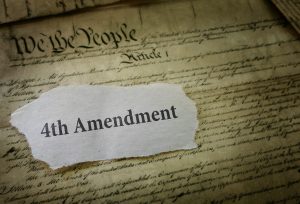
We often hear about law enforcement officers being required to show “probable cause” before searching a vehicle, making an arrest, or seizing a citizen’s property. But what is probable cause, and how is it applied on the street?
The idea of probable cause goes back to our Founding Fathers and can be found in the Fourth Amendment of the U.S. Constitution which guarantees that:
"The right of the people to be secure in their persons, houses, papers, and effects, against unreasonable searches and seizures, shall not be violated, and no Warrants shall issue, but upon probable cause, supported by Oath or affirmation, and particularly describing the place to be searched, and the persons or things to be searched."
This Amendment prevents local, state, or federal officers from searching or arresting citizens and seizing their property without some evidence that a crime has occurred.
Let’s look at what these words mean in practical terms.
Probable Cause and Warrants
To obtain a warrant (such as a search or arrest warrant) from a judge, an officer must sign a legal document (called an affidavit) outlining the specific reasons that an arrest, search, or seizure is warranted. The officer must obtain the warrant, which can now be done digitally, before proceeding with the search or arrest. For example, if an officer suspects that an illegal drug operation is being conducted out of a home, that officer may obtain a signed warrant from the court permitting a raid or search of the property. Without such a warrant, any materials seized in a search may not be admissible as evidence against an arrestee in court.
Probable Cause and No-Warrant Arrests & Searches
Often an officer may witness something suggesting that a crime has or is about to take place. Probable cause for a search or arrest must stem from some evidence that would cause a “reasonable person” to conclude that a crime has occurred. For example, an officer may notice a motorist driving erratically or unsafely. While this alone does not prove the occurrence of a crime (the driver may be experiencing a medical emergency), it is sufficient for the officer to pull the motorist over to investigate further. If upon speaking with the motorist the officer detects the odor of alcohol or observes an open container in plain view within the vehicle, this can constitute probable cause to (a) administer a field sobriety test to the motorist, (b) search the vehicle for further evidence of alcohol or drugs, and (c) make an arrest if the motorist fails or refuses a sobriety test. If probable cause has been established under such circumstances, anything the officer finds during the search (such as drugs or an unlicensed firearm) can be seized and used as evidence against the defendant.
Reasonable Suspicion vs. Probable Cause
Sometimes an officer may suspect that a crime has or is about to occur but requires more information before making (or not making) an arrest. In such cases, an officer may choose to detain a citizen for questioning. Detention is not arrest and does not automatically make an arrest inevitable. If you are detained by an officer, you have the right to ask why you are being held and if you are free to go. An officer does not need a warrant from a judge to detain you on-scene for questioning; however, they must prove they had a “reasonable suspicion” for making the original stop.
Probable Cause for Search
An officer may request to search your person or your vehicle if they have observed some event or evidence suggesting that a crime has occurred. An officer may conduct a legal search if:
- The detainee gives the officer permission to conduct a search
- The officer has reasonable suspicion that a crime has occurred
- The officer believes there is an immediate threat to public safety
- The officer believes critical evidence is in danger of being destroyed.
Compliance
If you are detained, it’s advisable to comply with all reasonable requests made by the officer on-scene. You should answer questions clearly and honestly, but you are not required to divulge information that might incriminate you. Also, you are not required to take a field sobriety test; however, an officer may use your refusal as grounds for an arrest.
If you are arrested and charged with a crime, an experienced bail bond agent can be your best ally. At Bond James Bond, our agents are seasoned professionals who can help secure your release and assist in ensuring that you make all court-scheduled appearances. Don’t miss important work and family obligations while awaiting trial. Contact Bond James Bond today, and discover how we can help.
Bond, James Bond, Inc. can handle any size or type of Georgia bail bonds in Barrow County, Bartow County, Cherokee County, Clarke County, Cobb County, Floyd County, Gordon County, Gwinnett County, Paulding County and Polk County. We are always open - 24 hours a day, 7 days a week, including holidays. We have 11 locations that are conveniently located to serve you better.
